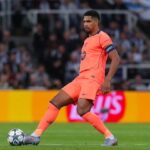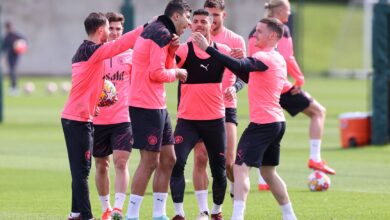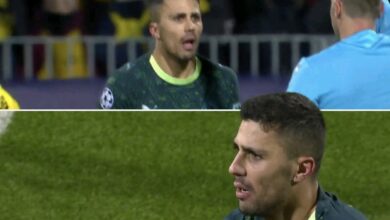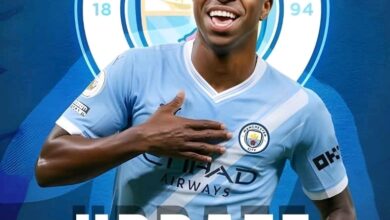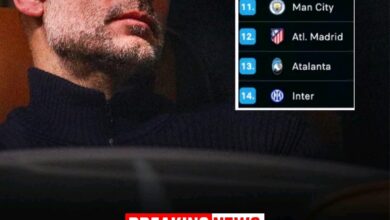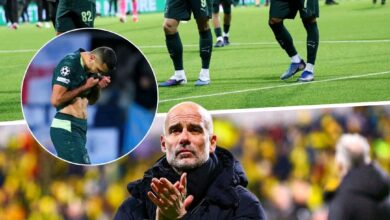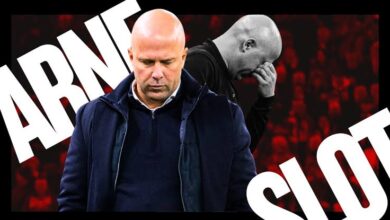Arne Slot rain prauses in Liverpool’s star , after a great performance today
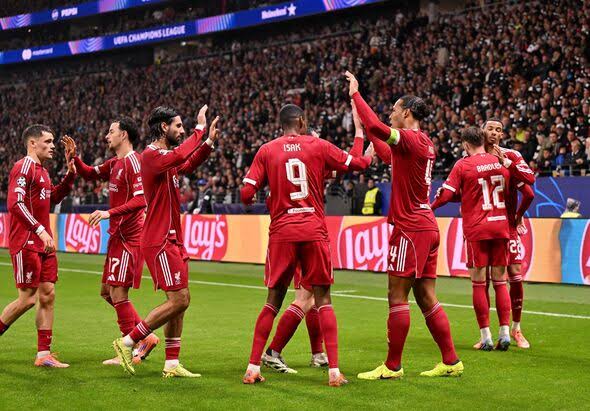
It was the night Arne Slot finally saw something he had been preaching for weeks. Under the floodlights in Germany, inside the roaring Deutsche Bank Park, Liverpool’s new manager got the exact response he had demanded — not just in performance, but in character. For weeks, Slot had talked about set-pieces, about the importance of details, about the small battles that decide big games. Against Eintracht Frankfurt in the Champions League, he finally saw two of his strongest warriors — Virgil van Dijk and Ibrahima Konaté — rise to that call and deliver exactly what he had been asking for.
The pressure on Liverpool before this game was unbearable. Four defeats in a row had broken confidence and tested patience on Merseyside. The defeat to Manchester United days earlier had left players drained and fans frustrated. Arne Slot, only months into his Liverpool project, was already facing whispers about whether he was the right man to carry on the legacy left by Jurgen Klopp. Every headline spoke about crisis, every pundit questioned his choices, and every match felt like a test of belief.
Yet, in Frankfurt, Slot’s message was simple: go back to basics. He had told his players that football is sometimes decided not by fancy passes or clever tactics, but by strength, courage, and intelligence at key moments — especially from set-pieces. It was an area Liverpool had once dominated under Klopp. The Reds used to terrorize opponents from corners and free kicks. But in recent months, that threat had faded. Slot wanted it back.
When the game began, it didn’t start well for Liverpool. Frankfurt’s aggressive pressing and quick transitions caught them off guard. The home fans, full of noise and confidence, pushed their side forward, and a mistake from the Reds led to an early goal for the German team. For a brief moment, the away bench looked tense. The cameras caught Slot’s face — calm but calculating, almost like he had seen it before. He didn’t shout or panic. Instead, he called over his assistant and gave instructions to adjust Liverpool’s shape.
Soon after, a spark came from an unexpected source. Hugo Ekitike, the French forward facing his former club, equalized with a well-placed finish. It was a personal moment for him — a statement that he belonged in this Liverpool side. Slot’s decision to trust him was already paying off. The goal lifted the team, and from that point, Liverpool began to grow in confidence.But the real magic came from the set-pieces.
First, Cody Gakpo swung in a dangerous corner from the right. It was perfectly placed — dipping into that area goalkeepers hate, between the six-yard box and the penalty spot. And there, rising above everyone, was Virgil van Dijk. The captain had been criticized in recent weeks for his leadership after the Manchester United loss, but on this night, he looked like a man reborn. His leap was powerful, his header unstoppable. The ball flew into the net, and for the first time in weeks, Van Dijk roared with emotion. His teammates surrounded him, and Slot clapped on the touchline with a faint smile. That was exactly what he wanted — strength, precision, and character.
Moments later, it happened again. This time, Dominik Szoboszlai delivered a perfect ball from another corner. And it was Ibrahima Konaté who crashed the ball home with his head, sealing Liverpool’s third goal of the evening. It wasn’t just a goal — it was a statement of dominance. The two centre-backs, often tasked with defending Liverpool’s fragile backline, had become the heroes in attack.
Slot had spoken in the days before the match about how crucial these moments are. “In tight games,” he said, “how you defend and attack from set-pieces can make all the difference.” He had been frustrated after the Manchester United loss, when poor defending from a corner cost Liverpool dearly. “If you are 1-1 and you have to defend one set-piece, defend it better than we did,” he had told the media. That frustration turned into motivation. The players heard him — and they delivered.
Behind the scenes, Slot had been working closely with his coaching staff to improve set-piece routines. He studied Arsenal’s example — the Gunners had been exceptional from dead-ball situations over the past two seasons. Slot wanted Liverpool to do the same. In training, he made players practice corner after corner, free kick after free kick, until their timing was perfect. It wasn’t glamorous work, but it was necessary. And now, it was paying off.
The mood among the fans who had travelled to Frankfurt was transformed. After weeks of doubt, they finally saw their team playing with pride again. Chants of “Liverpool, Liverpool!” echoed across the stands. It wasn’t just the scoreline — it was the attitude. Every tackle was cheered, every clearance applauded. Van Dijk led with authority, shouting encouragement to his teammates. Konaté, his partner, played with focus and aggression. Even the midfield, led by Alexis Mac Allister and Florian Wirtz, looked sharper and more confident.
After the game, Slot faced the media with a calmer tone. “We have spoken about set-pieces for weeks,” he said. “It is an important part of football. Tonight, we showed that if you work on it, if you stay patient, the results come.” He refused to get carried away, but there was clear satisfaction in his voice.
For Van Dijk and Konaté, the goals were more than just statistics. They were reminders of leadership and responsibility. Both defenders had been under scrutiny. Some pundits even said Van Dijk looked past his best. But against Frankfurt, he proved that experience still matters. He read the game superbly, controlled the backline, and inspired those around him. Konaté, meanwhile, showed maturity and hunger — a defender ready to be Liverpool’s future.
Slot’s plan wasn’t just about set-pieces. He also made tactical changes that helped Liverpool control the tempo. By pushing Wirtz slightly higher and allowing Szoboszlai more freedom, he created openings that stretched Frankfurt’s defense. Ekitike’s movement constantly dragged defenders out of position, and Federico Chiesa’s pace on the wing added danger on the counter. Even without Ryan Gravenberch, who missed the match due to an ankle injury, Liverpool’s midfield found balance.
Still, there were warning signs. Jeremie Frimpong was forced off with a minor injury, adding another concern for Slot. The Dutch coach admitted after the match that the fixture schedule had been brutal — “three games in seven days,” as he put it. Yet he refused to complain. “This is Liverpool,” he said. “We don’t make excuses. We find solutions.”
That attitude seemed to be spreading through the dressing room. Players who looked lost a few weeks ago now played with purpose. The body language was different. You could feel that something had shifted — maybe not fully restored, but definitely revived.
Liverpool’s improvement from set-pieces wasn’t accidental. Slot had noticed that opponents were sitting deeper against his side, defending in blocks and giving fewer open-play chances. That’s why he emphasized the importance of dead-ball opportunities. “Teams are willing to defend deep,” he explained. “So we must find other ways to hurt them. Set-pieces give us that chance.”
He had a point. When Klopp first took charge of Liverpool years ago, his team thrived on pressing and chaos. They broke teams with speed and energy. But now, under Slot, the challenge was different. Teams respected Liverpool too much to play open football against them. That meant patience, control, and creativity were needed — and efficiency from corners and free kicks was essential.
The summer signings were part of that plan. Florian Wirtz brought vision. Hugo Ekitike brought movement and unpredictability. And Szoboszlai, with his precise delivery, brought the quality Liverpool needed from set-pieces. Against Frankfurt, all three were involved in key moments. It was a glimpse of Slot’s Liverpool — a team still forming, but one that could soon become dangerous again.
When asked about the win, Van Dijk summed it up simply: “We knew what the manager wanted. We worked hard in training on these things. Tonight, we did what we had to do.” His words carried quiet pride — the pride of a captain who had heard the criticism and answered it the right way.
The result itself — a 5-1 victory — was more than Liverpool fans had hoped for. It didn’t just end a losing streak; it reignited belief. The players left the pitch smiling, exchanging hugs and applause with the supporters who had endured weeks of frustration. Slot, standing on the touchline with his arms folded, allowed himself a small grin as he watched his team leave the field. It was only one game, but it felt like the start of something.
The win didn’t erase the past four defeats, but it gave Liverpool something stronger — momentum. It showed that under Arne Slot, there was still fight, still structure, still identity. And above all, it showed that Liverpool’s biggest weapons — their spirit and unity — were back.
By the time the players boarded the plane home, the atmosphere was light. Music played in the dressing room, laughter filled the air, and for the first time in weeks, the journey back to Merseyside didn’t feel heavy. Slot knew tougher challenges were coming — Brentford at the weekend, then another crucial European tie — but at least now he had proof that his ideas worked.
In football, small victories can change everything. A single header, a single corner, a single goal can turn doubt into belief. On that cold night in Frankfurt, Liverpool rediscovered something they had lost — not just a win, but the feeling of being Liverpool again.
It was the story of a manager who refused to give up on his philosophy, of players who rose when it mattered, and of a club that, even in difficult times, finds a way to rise again. For Arne Slot, it wasn’t just about goals. It was about redemption. And for Liverpool, it was the night their fight returned — one powerful header at a time



